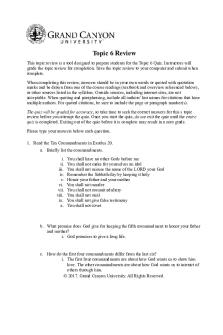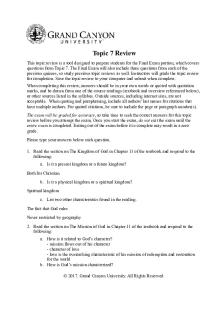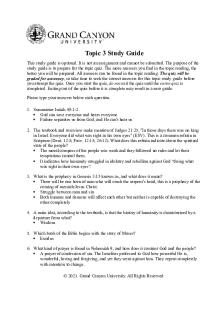CWV 101 301 RS T3Study Guide Online PDF

| Title | CWV 101 301 RS T3Study Guide Online |
|---|---|
| Author | KallyJo Wagner |
| Course | Christian Worldview |
| Institution | Grand Canyon University |
| Pages | 3 |
| File Size | 145.1 KB |
| File Type | |
| Total Downloads | 3 |
| Total Views | 165 |
Summary
......
Description
Topic 3 Study Guide This study guide is optional. It is not an assignment and cannot be submitted. The purpose of the study guide is to prepare for the topic quiz. The more answers you find in the topic reading, the better you will be prepared. All answers can be found in the topic reading. The quiz will be graded for accuracy, so take time to seek the correct answers for this topic study guide before you attempt the quiz. Once you start the quiz, do not exit the quiz until the entire quiz is completed. Exiting out of the quiz before it is complete may result in a zero grade. Please type your answers below each question. 1. Summarize Isaiah 59:1-2. God can save everyone and hears everyone Failure separates us from God, and He can't hear us 2. The textbook and overview make mention of Judges 21:25, "In those days there was no king in Israel. Everyone did what was right in his own eyes" (ESV). This is a common refrain in Scripture (Deut. 12:8; Prov. 12:15; 26:12). What does this refrain indicate about the spiritual state of the people? The moral compass of the people was weak and they followed no rules and let their temptations control them. It indicates how humanity struggled in idolatry and rebellion against God “doing what was right in their own eyes”. 3. What is the prophecy in Genesis 3:15 known as, and what does it mean? There will be one born of man who will crush the serpent’s head, this is a prophecy of the coming of messiah/Jesus Christ. Struggle between man and sin Both humans and demons will affect each other but neither is capable of destroying the other completely 4. A main idea, according to the textbook, is that the history of humanity is characterized by a departure from what? Wisdom 5. Which book of the Bible begins with the story of Moses? Exodus 6. What kind of prayer is found in Nehemiah 9, and how does it contrast God and the people? A prayer of confession of sin. The Israelites professed to God how powerful He is, wonderful, loving and forgiving, and yet they went against him. They repent completely with intention to change. © 2021. Grand Canyon University. All Rights Reserved.
7. Although created in the image of God, humanity became sinful by nature after the fall. How extensively does this original sin or depravity affect us according to Romans 3:10-23? No one is righteous No one does good Everyone is deceptive, curses, and is bitter Murderous Path of ruin and misery; no peace No fear of God Every person is under the law and is held accountable by God No one can earn justification, but God can provide it even if the law is broken FOR ALL HAVE SINNED AND FALL SHORT OF THE GLORY OF GOD Humanity was created to have life, but the fall introduced sin into the world, which led to the entrance of death in the world. Paul says that all people have sinned and fallen short of God's glory. 8. How did the fall (sin of Adam and Eve) affect the world according to Genesis 3:16-19? Pain in childbearing Desire for husband - he rules over you The ground is cursed, pain to eat from it Ground produces thorns and thistles, eat plants Sweat of your face to eat bread Death = return to dust 9. What metaphor does the textbook use to describe idolatry? an unfaithful spouse, Hosea, loves his wife even though she strayed from him 10. According to the textbook, what was the primary message of the Old Testament prophets? to get the people to flee from idolatry and return to God They pronounced judgment against Israel 11. List the names of Israel's first three kings. Saul David Solomon 12. After Israel divided into the northern kingdom and the southern kingdom, the southern kingdom of Judah endured much longer but eventually fell to what nation? Judah fell to Babylon 13. According to the textbook, the Wisdom literature (Job through Ecclesiastes) has what central theme? God was faithful to his covenant promises, and, despite the peoples' unfaithfulness, he did what he said he was going to do.
2
14. According to this topic's assigned reading, "The Mystery of Original Sin: We Don't Know Why God Permitted the Fall, but We Know All Too Well the Evil and Sin That Still Plague Us," by Shuster, what is the problem with the world? The world of Genesis 3 is the world we live in. Seemingly insignificant choices, unbelief, and pride are key aspects of the Genesis account, and of our ongoing struggle. We are corrupt, and creation suffers a curse on account of Adam and Eve's lapse—and our own. 15. According to that same Shuster article, why might God want us "to believe, trust, and obey him even when there is not a reason to do so that we can wrap our minds around"? God should be the center of our lives just as the tree was the center of the garden and because God belongs in the center of our lives and putting Him elsewhere would result in us not believing, trusting or obeying him.
Sources to use for this study guide: Diffey, D. (2020). Departure from wisdom. In Grand Canyon University (Ed.), The beginning of wisdom: An introduction to Christian thought and life (3rd ed.). https://lc.gcumedia.com/cwv101/the-beginning-of-wisdom-an-introduction-to-christianthought-and-life/v3.1/#/chapter/4 Grand Canyon University. (2020). CWV-101-301 topic 3 overview [Class document]. LoudCloud. https://lms-ugrad.gcu.edu/learningPlatform/user/login.lc
3...
Similar Free PDFs

CWV 101 301 RS T2Origins
- 4 Pages

CWV 301 RS T6Review Online
- 4 Pages

CWV 101 RS T1Review Online
- 4 Pages

CWV 101 RS T6Review Online
- 4 Pages

CWV 101 RS T1Study Guide Online
- 4 Pages

CWV 101 RS T7Review Online
- 3 Pages

CWV 101 RS T1Review Online
- 4 Pages

CWV 101 RS T3Review Online
- 4 Pages

CWV 101 RS T7Review Online
- 4 Pages

CWV-101-RS-T2Review-Online
- 4 Pages

CWV 101 RS T2Review Online
- 4 Pages

CWV-101-RS-T1Review-Online
- 3 Pages
Popular Institutions
- Tinajero National High School - Annex
- Politeknik Caltex Riau
- Yokohama City University
- SGT University
- University of Al-Qadisiyah
- Divine Word College of Vigan
- Techniek College Rotterdam
- Universidade de Santiago
- Universiti Teknologi MARA Cawangan Johor Kampus Pasir Gudang
- Poltekkes Kemenkes Yogyakarta
- Baguio City National High School
- Colegio san marcos
- preparatoria uno
- Centro de Bachillerato Tecnológico Industrial y de Servicios No. 107
- Dalian Maritime University
- Quang Trung Secondary School
- Colegio Tecnológico en Informática
- Corporación Regional de Educación Superior
- Grupo CEDVA
- Dar Al Uloom University
- Centro de Estudios Preuniversitarios de la Universidad Nacional de Ingeniería
- 上智大学
- Aakash International School, Nuna Majara
- San Felipe Neri Catholic School
- Kang Chiao International School - New Taipei City
- Misamis Occidental National High School
- Institución Educativa Escuela Normal Juan Ladrilleros
- Kolehiyo ng Pantukan
- Batanes State College
- Instituto Continental
- Sekolah Menengah Kejuruan Kesehatan Kaltara (Tarakan)
- Colegio de La Inmaculada Concepcion - Cebu



